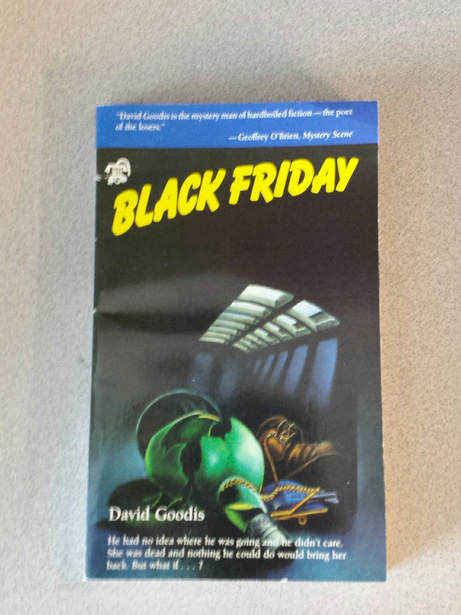Serendipity? Perhaps. Read on.
As the introduction to the novel tells us, Goodis was a strange man: he lived with his parents until their deaths (except for a brief time in LA working as a screenwriter when he rented a couch from a coworker for $4 a week), never bought clothing (he preferred wearing friends' hand-me-downs, even to the point when they were no longer wearable) and had several blatantly-obvious obsessions which appear over and over in his work, such as men caught between immensely-strong-willed, almost always overweight, women and fragile, waifish women. He also, supposedly, was obsessed with the idea of people being brought low -- once-rich men living on the streets, for example. Also sado-masochism.
I haven't read nearly enough Goodis to come to this conclusion myself, but if it's true, BLACK FRIDAY is certainly no exception. The story is of a man named Al Hart, the second son of a rich family, on the run from a murder charge. By sheer coincidence, he witnesses a murder stemming from a fall-out among a gang of thieves and, through impressing the leader of the gang with his guts and knowledge, is taken in as one of them. From there, the story is ostensibly about Hart proving to Charley, the gang's leader, that he is a "professional" criminal and taking part in a huge art heist if he can do so. This is largely a maguffin, though, as the real story is about Hart's torturous inner turmoil over Charley's girlfriend--an obese, immensely-strong-personalitied, over-sexed woman--falling in love with him, Hart, and making him hers (thus giving him a place in the gang, when he has literally nowhere else to go) and his feelings over Myrna, the sister of the man he accidentally killed (thus impressing Charley enough to give him a chance in the first place).
Most of the novel from there is dialogue among small groups of characters or descriptions of Hart's inner monologue. It felt less like a novel than a three-act play designed for a very small cast. For all that, it's not a terrible read, but it's misclassified as a crime novel; there is crime in it, but only to move the story along. If I'd been better informed as to what this book really was, I'd not have read it.
For all that, I don't regret reading it, mind you, but I can't really recommend it. It's noir, certainly, but far too much tortured-loner-lost-in-himself and far too little crime to make it interesting.
New text follows:
I've since read other Goodis novels and felt that, while they were better than BLACK FRIDAY, they don't hold my interest as well as his stories, novelettes and novellas. Some of the same themes apply, but he also seemed to feel as if he could branch out more in his shorter works. Which makes sense, of course, since they were a lesser time-investment. That said, I would really like to read a collection of Goodis short stories but sadly, it doesn't appear one exists.


 RSS Feed
RSS Feed